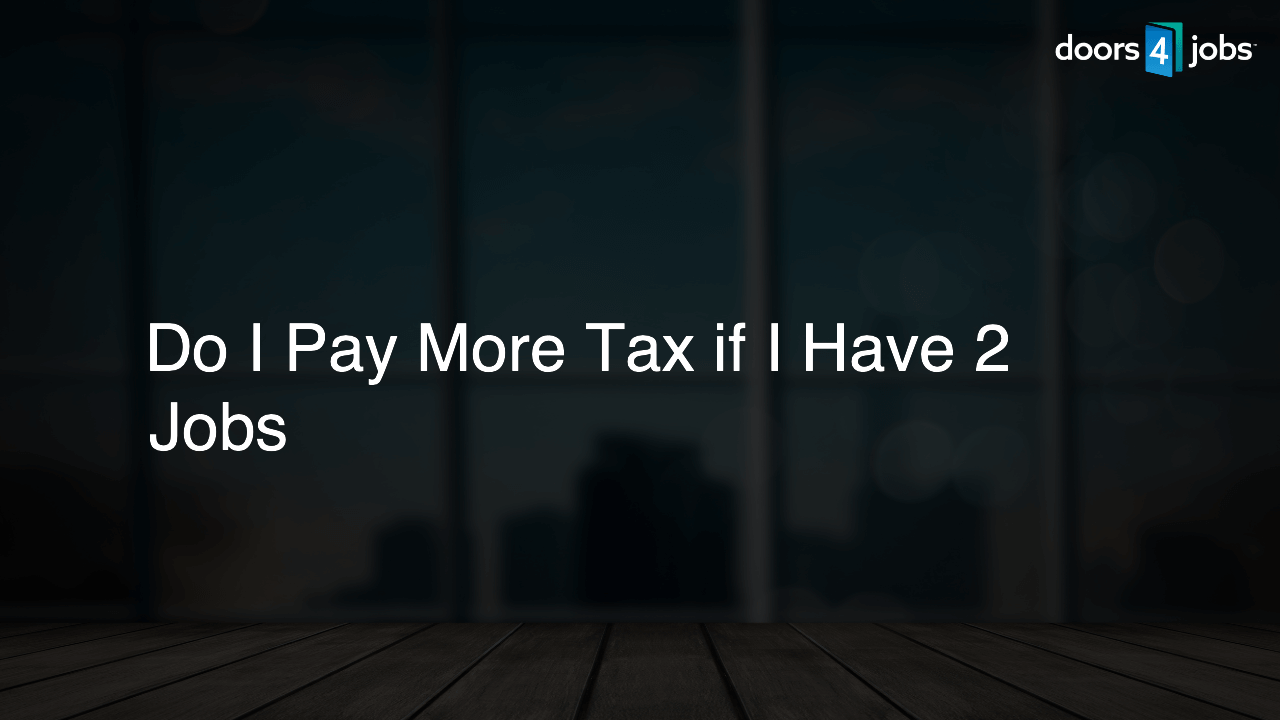Yes, having two jobs may result in higher tax rates, as your combined income from both jobs might push you into a higher tax bracket. Additionally, your second job might not correctly account for tax allowances, possibly leading to underpaid taxes that you will need to settle later.
Understanding Tax Brackets
Tax brackets are income ranges that determine the rate at which an individual’s income is taxed. As your income increases, you may be pushed into a higher tax bracket, resulting in a larger proportion of your income being taxed.
Combined Income and Tax Rates
If you have two jobs, your combined income from both jobs might push you into a higher tax bracket compared to having just one job. This could lead to a larger portion of your income being taxed at a higher rate, resulting in more taxes being paid overall.
Example: Tax Bracket Increase
If your primary job earns you $30,000 per year, and you take on a second job earning $20,000 per year, your total yearly income becomes $50,000. If the tax bracket changes when your income exceeds $40,000, taking on that second job will push you into a higher tax bracket, causing a higher percentage of your income to be taxed.
Allowances and Tax Withholdings
Your second job might not correctly account for your tax allowances because employers use the information you provide on your W-4 form to calculate tax withholdings. If each employer calculates these withholdings independently, they might not be aware of your total income, which could lead to underpaid taxes.
Adjusting Your W-4
To ensure accurate tax withholdings, you can adjust your W-4 form for your second job. You may increase the withholding rate by claiming fewer allowances, avoiding underpayment and potential penalties for underpaid taxes.
Year-End Tax Liability
It’s essential to check and adjust your withholdings periodically, especially if you have multiple income sources. This helps ensure you’re not overpaying or underpaying taxes throughout the year and reduces the chance of a large balance due or refund at tax filing time. Consult a tax professional for guidance on adjusting your withholdings appropriately.
Social Security and Medicare Taxes
In addition to income taxes, you may also be subject to Social Security and Medicare taxes on your earnings from both jobs. These taxes, known as FICA taxes, usually have fixed rates, regardless of your income. However, as your total earnings increase, the amount of FICA taxes you pay on those earnings will also increase.
Additional State and Local Taxes
If your additional job is in a different state or locality than your primary job, you might face additional state and local taxes. Each state and municipality has its own tax laws, which can impact your overall tax liability. Make sure to research and understand local regulations to ensure proper tax compliance.
Impact on Tax Credits and Deductions
An increase in your overall income due to having two jobs may disqualify you from certain tax credits and deductions, such as the Earned Income Tax Credit (EITC) or student loan interest deductions. Losing eligibility for these tax breaks could increase your overall tax liability.
Managing Estimated Tax Payments
If you’re self-employed or work as a contractor for your second job, you might need to manage estimated tax payments. Self-employed individuals typically need to make quarterly estimated payments to cover their tax liability. It’s crucial to understand your tax obligations, as underpaying estimated taxes throughout the year may result in penalties and interest charges.
Track Expenses for Work-Related Deductions
If either or both of your jobs involve work-related expenses, such as using your own vehicle, purchasing work supplies, or maintaining a home office, you might be eligible for tax deductions. Keep accurate and organized records of your expenses throughout the year to ensure you can take advantage of these deductions and reduce your taxable income.
FAQ Section
Below are some of the most frequently asked questions related to having two jobs and the impact on taxes. Refer to these questions and answers for a better understanding of the implications of multiple income sources on your tax situation.
How can I know if I’m withholding enough taxes from both jobs?
To ensure that you’re withholding the correct amount of taxes, you can use the IRS’s Tax Withholding Estimator. This tool can help you determine the appropriate withholding for each job and help you avoid underpayment or overpayment of taxes throughout the year.
Will I need to fill out a separate W-4 form for each job?
Yes, you should fill out a separate W-4 form for each job, as it allows you to specify different allowances and withholding rates for each employer. This ensures accurate tax withholding based on your total income from all your jobs.
Can multiple jobs push me into the Alternative Minimum Tax (AMT)?
While having multiple jobs may increase your overall income, it does not directly cause you to be subject to the Alternative Minimum Tax (AMT). The AMT is levied on individuals with high incomes and certain tax preferences. Though increased income may contribute to your AMT liability, having multiple jobs alone does not trigger the AMT.
How do I file taxes if I have multiple W-2 forms from different employers?
When filing your taxes, you’ll need to include all the W-2 forms you received from your employers. You’ll enter the information from each W-2 into your tax return, either using tax software or by filling out the corresponding fields on the appropriate IRS form. Your total income and withholdings will be combined and considered when determining your tax liability.
Do I need to report income from a part-time job if I already have a full-time job?
Yes, you are required to report all income earned, including income from part-time or side jobs, whether on a W-2 or 1099 form, on your tax return. This ensures that your tax liability is calculated accurately based on your total income from all sources. Failure to report income may result in penalties and interest charges.











